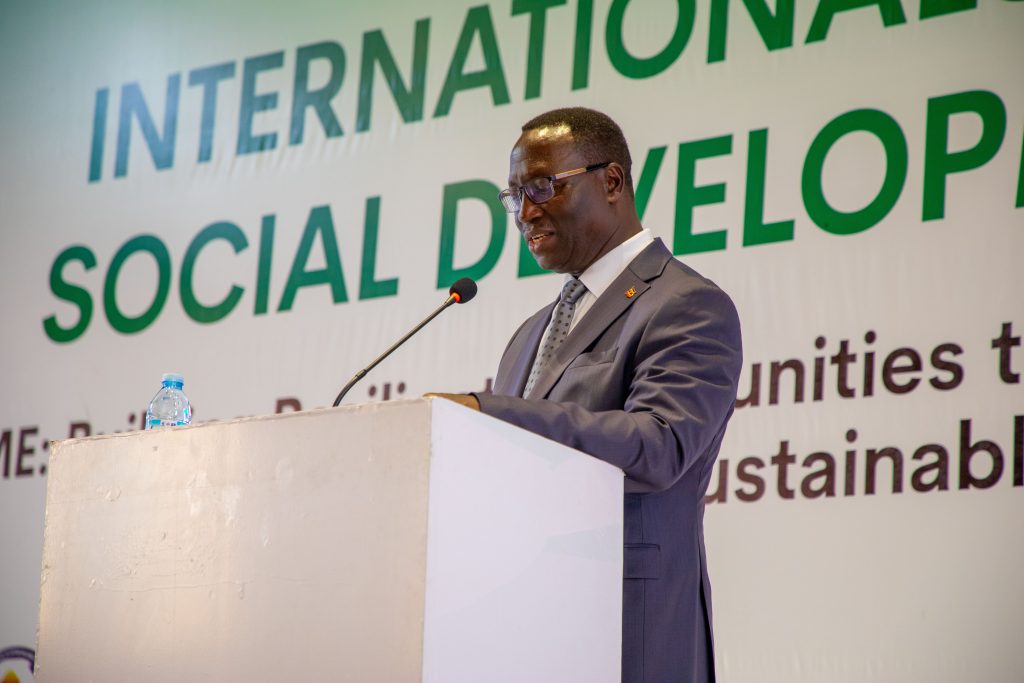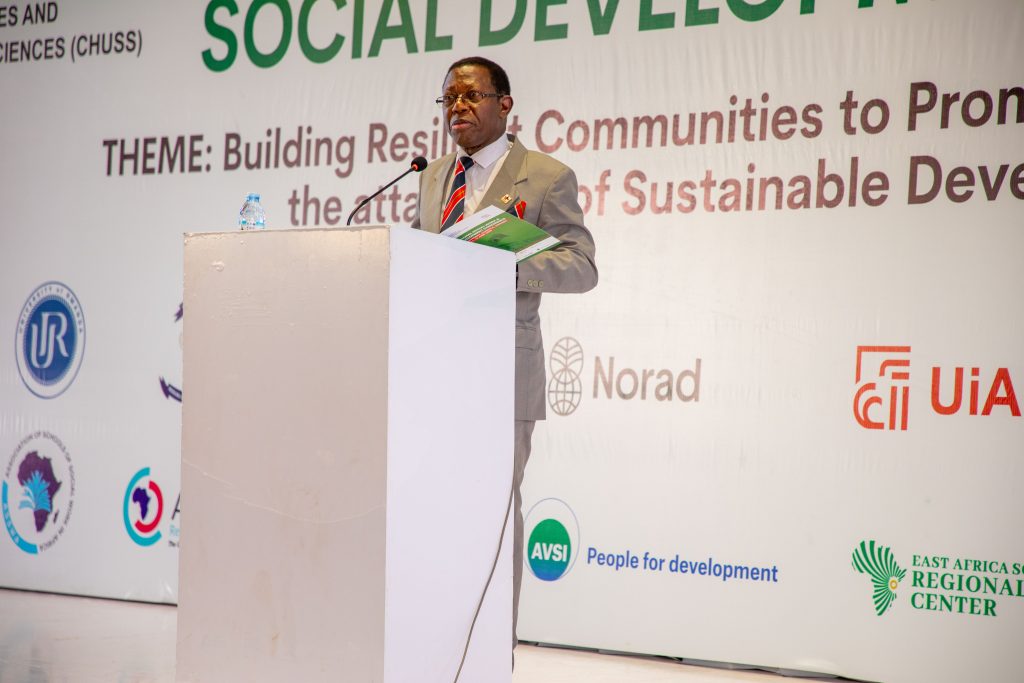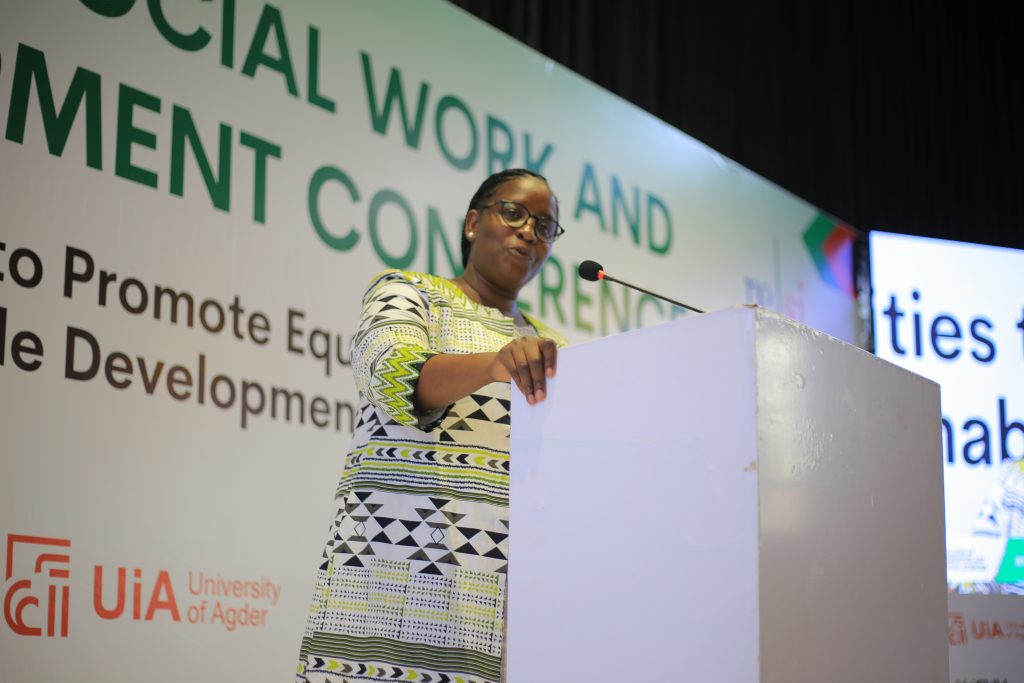BY TUKACUNGURWA JULIUS
Hosted by College of Humanities and Social Sciences (CHUSS), the International Social Work and Social Development Conference kick started at Makerere University, Uganda running from June 16th to 18th, 2025 under the theme; Building Resilient Communities to promote Equity and Social Inclusion for the attainment of Sustainable Development Goals (SDGs).
This event was co-hosted by the East Africa Social Work Regional Resource Centre and the Association of Schools of Social Work in Africa (ASSWA), under the auspices of the RESILIENT project with an aim to foster academic dialogue, critical inquiry, and discussions on pressing issues surrounding equity, social justice, and inclusion, framed within the context of the Sustainable Development Goals (SDGs).
The successful organization of the conference has also been attributed to other partners like Norad, University of Agder, The AfriChild, University of Rwanda, East Africa Social Work Regional Resource Center, UNICEF, AVSI, ICEA Lion,TAASISI YA USTAWI WA JAMII and many others.
Speaking at the opening ceremony, Dr. Aggrey David Kibenge, Permanent Secretary in the Ministry of Gender, Labour and Social Development, emphasized the transformative power of social work and social development in building resilient communities. “Our nation’s vision 2040 lays a clear path to transition from a peaceful society to a modern and prosperous nation,” he said. “This conference is a reminder of our collective responsibility to ensure that all Ugandans, especially the vulnerable, have access to quality social services.”

The Permanent Secretary highlighted the critical role of social protection in achieving national development goals. “The Government of Uganda recognizes social work and social development as critical instruments for promoting inclusive socio-economic growth,” he noted. “Uganda’s Vision 2040 identifies social protection as vital to achieving middle-income status, while the National Development Plans NDP3 consider it a key human capital development intervention.”
Dr. Kibenge underscored the importance of a comprehensive national social protection system, founded on social security and social care support pillars. “The National Social Protection Policy of 2015 underscores the importance of social protection in the attainment of the country’s national development goals. It identifies social care and support services as the second pillar for addressing risks and vulnerabilities faced by vulnerable individuals.”
The Permanent Secretary pointed out that the current public funded and managed statutory social service workforce in Uganda is insufficient to cover the large number of vulnerable groups. “The ratio of social service workforce to vulnerable children is 1 to 6,000 compared to the global standard ratio of 1 to 200,” he noted. “This results in high caseload numbers of people with unmet needs and has led to high numbers of social ills.”
Dr. Kibenge emphasized the need for a well-planned, developed, and supported social services workforce. “A well-regulated social care and support service system addresses the social determinants of health, such as poverty, social exclusion, poor nutrition, and housing,” he said. “Social care enables individuals to live normal lives and carry out tasks they otherwise wouldn’t be able to, whether it is emotional support, physical support, or social support.”
He commended the partnership between Makerere University and other institutions in fostering social work education and practice in East Africa and interested international delegates to discover the beauty of Uganda, highlighting its national parks, iconic tree-climbing lions, and rare mountain gorillas.
Representing the Vice Chancellor, Professor Buyinza Mukadasi Deputy Vice Chancellor Academic Affairs at Makerere University, inked the significance of collaboration and innovative solutions in addressing global challenges noting that the prestigious conference comes at a time when the world is facing numerous challenges, and ‘we need to come together to co-create and develop solutions to these challenges’

He pointed out the crucial role social workers play in addressing global challenges, including poverty, inequality, and social justice.
The professor emphasized the importance of promoting collaboration and fostering innovative solutions in building stronger and resilient communities.
Mukadasi also stressed the need for academic research to be translated into impact and policy. “If you want to be a university for the future, it means you need to translate the academic research into impact and into policy and practice,” he said. “That is our resolve, and we want to renew our commitment to continue supporting you in this endeavor as you accelerate your efforts to social transformation in all forms.”
He noted that, Makarere not only a university that is generating and producing knowledge but is a university for the future, to this effect, ‘we need to come together and provide solutions to the challenges of the day.’
Prof. Mukadasi expressed gratitude to the organizing committee and wished the conference participants success and the organizing committee, led by Professor Awich and the team as he wished them a fruitful deliberation, and really a rewarding engagement in the two days.
The Chief host, Prof. Hellen Nkabala, Principal of the College of Humanities and Social Sciences, expressed her pride in hosting the conference, highlighting the importance of the humanities and social sciences in addressing global challenges. “We are the mine of excellent minds. In the next three days, we are going to enjoy the excellence that will be oozing from our students and staff, our colleagues from all around the world who will be presenting”, she noted.

Prof. Nkabala thanked the Vice Chancellor for his support and the partners, including the Ministry of Gender, UNICEF, and AfriChild, for their collaboration. “We cannot exist without you,” she noted. “At a time when the humanities and social sciences are under threat, it is only events like this that affirm our very existence.”
The Principal expressed confidence that the conference would provide valuable insights and solutions to global challenges. “I am confident that at the end of these three days, we shall be able to tell the world and show them the compass that they are supposed to take in order for us to ensure that there is inclusion and to ensure that we are building resilient communities,” she said.
Prof. Nkabala also made a clarion call for continued partnership, particularly with the people of Norway through NORAD and NORHED. “We are very, very grateful and please hold with us… it’s time for us to continue so that as we stand here next time, we are celebrating more communities and more resilience in the communities,” she said.
The Chairperson Organizing Committee of the Conference who doubles as the Deputy Principal CHUSS, Prof Eric Awich Ochen highlighted Uganda’s allure with a warm welcome to attendees expressing great honor to welcome them to the Pearl of Africa, painting a picture of a vibrant nation where ‘everything actually thrives.’
The conference, he explained, was strategically timed to coincide with the culmination of the “Building Resilient Communities Through Inclusive Education in Eastern Africa” project, a six-year initiative funded by the Norwegian government through NORAD.
Awich noted that the conference serves as a platform for “knowledge dissemination and sharing of experiences,” offering a space to showcase findings and best practices from the project, alongside global perspectives on sustainable development goals; and expressed gratitude to the government of Norway, UNICEF, AfriChild, National Association of Social Workers of Uganda, the regional social work associations in Africa, and ICEA Lion Insurance.
Dr. Denis Muhangi, Head of Department for Social Work and Social Administration at Makerere University, expressed gratitude in that the conference was organized under his department and lauded all attendees who heeded to the call. He went on reveal the department’s long history, dating back to 1969, and its contributions to training social workers who have made a significant impact in communities, local governments, and NGOs.

“We’ve been training social workers who are doing a great job in this country, in communities, in local governments, in NGOs, at a national level, they are everywhere,” he noted.
He emphasized the importance of the conference theme, and the relevance of the topics to be discussed. “The theme for this conference really I think is very, very timely, talking about building resilient communities, talking about equity and social inclusion,” he said.
Dr. Muhangi expressed gratitude to the sponsors of the Resilient Project, the Norwegian government through NORAD, and the co-hosts of the conference. “I want to thank the sponsors of this conference, the co-hosts, I want to thank all of you who submitted abstracts and papers,” he said. “I hope that we shall enjoy the discussions that will contribute fruitfully to these discussions.”
The conference is premised to provide a rich menu of topics, ranging from child well-being to issues of older persons, and from the role of communities to North-South partnerships.
In a spirit of collaboration and commitment to community resilience, Mr. Timothy Opobo, the Executive Director of the AfriChild Centre expressed gratitude for the partnership, highlighting the conference’s theme as directly aligned with AfriChild’s core mission as a research and knowledge development center focused on child wellbeing.
He emphasized the importance of strong, inclusive, and resilient communities as the cornerstone of sustainable development, articulating the need to “leave no one behind, especially children, women and persons with special needs and marginalized groups” as not only a moral imperative but also a strategic one.

Opobo underscored that resilience is not built in isolation but “requires intentional investment in systems and services in addressing social norms that promote inclusion, empower communities and uphold human dignity.”
He called for collaboration across sectors, including government, academia, civil society, and development partners, to generate evidence that will “influence policy and scale what works.”
Highlighting the challenges faced by Uganda and other nations, he also stressed the unique opportunity to “reimagine development pathways that are community-led, equity-driven and child-centered.”
Nareeba Peter, General Secretary of National Association of Social Workers of Uganda emphasizing the critical role of social work in addressing contemporary societal challenges noting that this forum is a great opportunity to Social Work Educators, Practitioners and Students as we undertake to update knowledge and skills to engage in evidence-based teaching and learning and social work practice interventions.”
He expressed gratitude to the College of Humanities and Social Sciences, the Association of Schools of Social Work in Africa, the Association of Social Workers Uganda, AfricChild, and Makerere University for their support in hosting the event.
He urged attendees to collaboratively “work together and promote and ensure resilience for individuals, communities and the families where we serve.”
He also detailed NASU’s collaborative efforts with the government to strengthen social service systems, including the development of a national strategy to bolster the social service workforce, and a bill aimed at regulating social workers to ensure quality and ethical service delivery.
He pledged continued support to universities and agencies in knowledge generation and capacity building, expressing confidence that the social work fraternity in Uganda and beyond will build a strong resilient team for better services and welfare at large.
Day One featured two powerful keynote addresses, Professor Antoinette Lombard delivered a keynote on “From Crisis to Cohesion: Building Resilient Communities for an Inclusive and Sustainable Future” which provided a comprehensive framework for understanding the interconnectedness between crisis, resilience, and sustainability. According to Lombard, ‘a crisis must be transferred into an opportunity to become resilient.’ She emphasized the need for a transformative approach to building community resilience, one that prioritizes social cohesion, adaptation, and disaster risk reduction.
Lombard argued that ‘communities that can adapt socially, structurally, and institutionally are the ones most capable of withstanding and recovering from crisis.’ She highlighted the importance of understanding the specific barriers and protective factors that influence psychological well-being and resilience in communities, particularly in rural and indigenous contexts.
The professor noted that ‘building resilient communities requires a transformative process, anchored in the recognition of our interdependence with the planet and the need to operate within both planetary and social boundaries.’ She emphasized that the Sustainable Development Goals (SDGs) provide a shared blueprint for achieving a world where cohesion, resilience, and sustainability are lived realities.
Lombard’s address exposed the importance of social workers being at the forefront of building community resilience, particularly in the preparation and mitigation phases of disaster risk reduction. She argued that ‘it’s achievable, it’s not just technical, it’s actually the heart of transformation and cohesion.’
The professor’s emphasis on the doughnut economic model, developed by Kate Raworth, highlighted the need to operate within planetary boundaries while ensuring human dignity and well-being. Lombard noted that “those left behind” – the most vulnerable populations – must be targeted in disaster risk reduction and sustainability efforts.
By working together and fostering a deep understanding of community needs and strengths, we can create a world where resilience and sustainability are not just ideals but lived realities. ‘By prioritizing social cohesion, adaptation, and sustainability, we can create resilient communities that thrive in the face of crisis and adversity.’
Professor Jeannette Bayisenga, Jeannette Bayisenge, Minister of Public Service and Labour in Rwanda delivered another keynote on ‘Integrating Gender in Social Work for Resilient Communities and Transformative Change.’ emphasizing the importance of gender integration in social work, citing examples of social workers advocating for women’s inclusion in leadership committees and providing holistic support to teen mothers. “What we are witnessing here, it’s not charity, it’s not a favor, it’s justice, it is Resilience in action,” she said.
Prof. Bayisenga highlighted the interconnectedness between gender, social work, and community resilience, emphasizing that gender should not be an add-on but a core strategy for achieving resilience. She discussed the framework of 4Rs of gender-integrated social work, which includes recognizing diversity, responding to needs, reforming unequal systems, and resisting oppression.
The professor presented statistics on gender inequalities, including the fact that it will take 137 years to end extreme poverty among women and that 51% of countries have at least one restriction preventing women from doing the same job as men. “When you look at the statistics, we see that 47.8 million more moderately or severely insecure are women,” she noted.
Prof. Bayisenga emphasized the importance of education in reducing gender imbalances and highlighted the need for social workers to integrate gender perspectives in their work. “When social workers integrate gender perspective in their working, they uncover the challenges that the community in its diversity experiences but also the opportunities that are there to co-create together with the members of the community the solution that leads to the resilience within the community,” she said.
The professor also discussed the production and persistence of inequalities within social work, highlighting the dilemma that social workers face in upholding social justice while sometimes failing to address injustice due to institutionalized and normalized inequalities. “The global system of unequal relations in which social work operates is powerful and hinders the application of feminist principles,” she noted.
Prof. Bayisenga wrapped her keynote by emphasizing the potential of social work to generate knowledge and practical skills to reduce discrimination and promote social justice. “If you want to build communities that are truly resilient, you must invest in social workers that are brave, bold, and unapologetically sensitive and feminist,” she said.
She believed that by recognizing diversity, responding to needs, reforming unequal systems, and resisting oppression, social workers can play a critical role in promoting social justice and reducing discrimination.
The International Social Work and Social Development Conference 2025 has brought together experts and practitioners to discuss pressing issues surrounding equity, social justice, and inclusion. It highlights the critical role of social work and social development in building resilient communities and promoting sustainable development. Through keynote addresses, remarks, and presentations, participants have emphasized the importance of collaboration, innovation, and social responsibility in addressing global challenges.

Participants have expressed their commitment to working together to generate knowledge, promote social justice, and build stronger and resilient communities. The conference has provided a platform for knowledge dissemination, sharing of experiences, and development of solutions to global challenges. With the guidance of experienced professionals, the conference aims to make a meaningful impact on the lives of people and communities worldwide, promoting a more equitable and just society.

